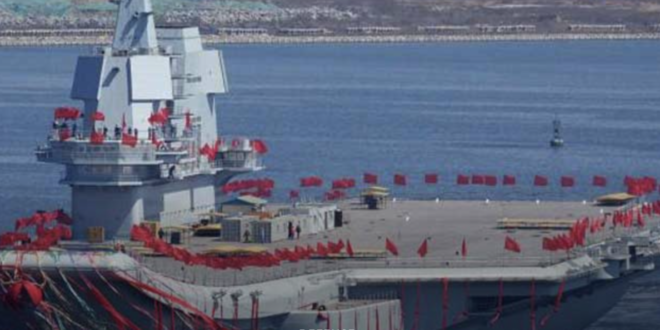Forecasting exercises focused on American power projection in the Indo-Pacific invariably hone in on the doom-and-gloom scenario of an outbreak of war between China and the United States as a result of territorial clashes – particularly maritime territorial clashes over Taiwan, or, more rarely, American forces intervening in territorial disputes between China and its other regional neighbors. Few of these forecasting exercises, however, focus on quite another nightmare scenario – the potential collapse of Chinese power in the Indo-Pacific, potentially as a result of an internal implosion within China’s government or a regional decline comparable to the fall of the Soviet Union. Such a scenario would establish a power vacuum in the region, and one which the United States may prove unprepared to adequately fill.
As the prospect of an outbreak of war is concerned – such a nightmare scenario has been pondered numerous times by geopolitical analysts and science fiction novelists alike. And a nightmare scenario it would be. An outright war between the United States and China in the Pacific would mean the first war directly fought between two nuclear powers in the twenty-first century. This is not even mentioning the risk of both powers exploring new, dark frontiers in non-kinetic (energy, cyber, and information) warfare. It should not need to be said that, although there is some possibility of such an occurrence, there is at present little probability.
For one thing, both powers are likely familiar with the Cold War-era nuclear deterrence theories that formed the doctrine of Mutually Assured Destruction, or MAD. In an American intellectual context, such ideas can be traced back to classic theoretical writings like Henry Kissinger’s Nuclear Weapons and Foreign Policy, or Thomas Schelling’s Arms and Influence. While the layperson may bite their nails over unfounded rumors of war, academics, military leaders, and policymakers tend to remain acutely aware of how the looming threat of nuclear catastrophe keeps world leaders’ hands off of the red button.
This makes the threat of direct, kinetic war between the United States and China thankfully unlikely. This does not rule out proxy conflicts, which should serve as the basis for another potential forecast concerning the future of U.S.-China relations. It is, however, the sensationalism of this topic – a prospective war, either direct or by proxy – between China and the U.S. – that makes it more attractive to speculate on than other outcomes, the collapse of Chinese power in the Indo-Pacific included.
So far, in spite of various conflicts, the U.S. has proven lucky where internal changes within the People’s Republic of China are concerned. The rise of Deng Xiaoping in the 1980s as well as the entry of China into the World Trade Organization (WTO) in 2001 fostered hope among U.S. policymakers that China would be incorporated into an American-led international economic and political order. Like many optimistic prophecies among the U.S. foreign policy elite, this prediction proved foolish. This dilemma is addressed in Philip Levy’s 2018 Foreign Affairs article, “Was Letting China into the WTO a mistake?”
More recently, in October of 2023, Xi Jinping met with Governor Gavin Newsom of California, and the U.S. government-backed global news publication Voice of America struck an optimistic tone in an October 26, 2023 article titled “Are China, US Seeking Warmer Ties?” This optimism, like the optimism that motivated the U.S. to encourage China’s entry into the WTO, may prove dangerous. It may prove dangerous not because of intended subterfuge by China under the leadership of Xi Jinping, but because of the historical precedent presented by a similarly conciliatory path taken by another rival power to the U.S. in the late 20th century: the Soviet Union. Xi Jinping in the moment recalls the late Mikhail Gorbachev, who oversaw the end of Communist power (as spearheaded by Russia) in Eastern Europe and Central Asia. We need only to follow the historical path taken in the region to determine how a roadmap for a potential decline in Chinese power under Xi Jinping may play out.
Those alive and politically aware in the 1990s and early 2000s might remember that post-Soviet Russia saw the rise of Boris Yeltsin, a corrupt leader with significant character flaws including alcohol addiction. The era also saw the rise of predatory oligarchs and significant challenges to Russia’s economy. Most tragically, the collapse of the Soviet Union and the subsequent decline of Russia in the 1990s led to the rise of Vladimir Putin. Like many other autocrats throughout history, Putin – ever the opportunist – saw an opening to take advantage of the chaos, climbing through the rubble of Russia’s economy and political system to build the Russian Federation’s current police state. It is unlikely that American commentators or analysts, blinded by notions such as Francis Fukuyama’s “End of History” or misguided optimism toward the future of Russia and Eastern Europe, foresaw Russia’s more recent incursion into Ukraine, Russia’s intervention in the 2016 U.S. presidential election, or Russia’s welcoming of former National Security Agency contractor Edward Snowden – who brought with him a treasure trove of U.S. intelligence secrets, directly harming his country of origin.
Xi Jinping, if recent media coverage is to be believed, has placed himself in a very similar position to Mikhail Gorbachev. In pursuing warmer ties with the U.S. under Joseph R. Biden, Xi Jinping may be indirectly setting the path for the decline of Chinese power in the Indo-Pacific. U.S. policymakers may welcome such a change as an opening for American influence in the region.
Such optimism, however, may prove a mistake. History does not repeat itself, as the adage goes, but it does all too often rhyme. The aftermath of the Soviet Union’s collapse is not a poem worth reciting. U.S. policymakers must therefore prepare for a circumstance rarely envisioned by analysts of foreign affairs: the collapse of Chinese power in the Indo-Pacific, and the multitude of dangers that such a collapse may ultimately bring.
 Geostrategic Media Political Commentary, Analysis, Security, Defense
Geostrategic Media Political Commentary, Analysis, Security, Defense





